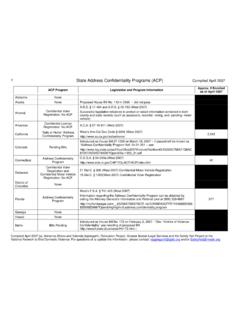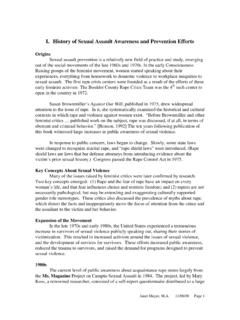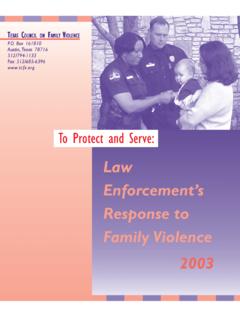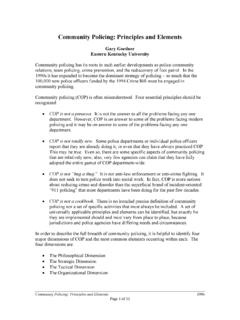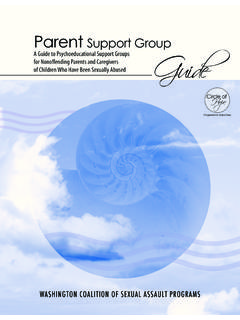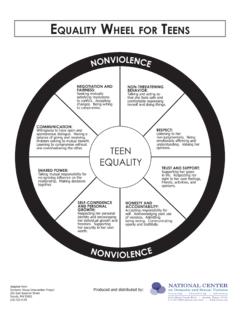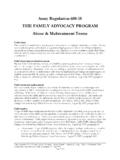Transcription of Compiled by the North Carolina Coalition Against Domestic ...
1 Catalog of Evidence-Based and Promising Practices Compiled by the North Carolina Coalition Against Domestic violence for The North Carolina DELTA State Steering Committee Committee members used this catalog when developing North Carolina s 10-Year Plan to Prevent Intimate Partner violence to inform their recommendation of dating violence prevention and healthy relationship promotion programming for use in community, faith and school-based settings. This catalog supported by Cooperative Agreement Number 5US4CE4224866-06 for the North Carolina Coalition Against Domestic violence s Domestic violence Enhancement and Leadership through Alliances (DELTA Program from the Centers for Disease Control and Prevention).
2 Its contents are solely the responsibility of the authors and do not necessarily represent the official views of the Centers for Disease Control and Prevention. Researched and Compiled by: Leah Perkinson, MPH, Prevention Specialist, NCCADV NCCADV 123 W. Main St., Ste. 700 Durham, NC 27701 Phone: 888-232-9124 NCCADV Western Office PO Box 17398 Asheville, NC 28816 Phone: 828-505-3708 1 COMMUNITY ENGAGEMENT 2 RELATIONSHIP NORMS / PARENTING SKILLS NC DELTA:Prioritized Goals and Outcomes Across Strategic Directions Life Stage Prioritized Goal Prioritized Outcome Increase healthy relationship social norms among children By 20XX, the proportion of community-based organizations (daycare school, after school programs, faith communities, girl/boy scouts, boys and girls clubs, YMCA, YWCA) that offer a program that has been shown to increase healthy relationship social norms among children will increase by X% as measured by pre and post assessments.
3 Increase IPV prevention and healthy relationship building content in youth-oriented agencies and institutions Increase leadership development and community engagement opportunities for adolescents Increase positive peer messages received by adolescents through social networks and gathering places (including virtual space) By 20XX, improve the media advocacy skills of intimate partner violence agencies and allies in NC by XX% as evidenced by pre and post training assessments. Increase IPV prevention and healthy relationship building programming and policies within post-secondary educational institutions including colleges and universities, community colleges and technical schools Increase healthy relationship social norms among adolescents By 20XX, increase by the number of schools in NC which utilize the intimate partner violence prevention curriculum endorsed by NC DELTA State Steering Committee by XX % as compared to the number of endorsed programs reported in the 2006 HB1354 study conducted by the NC Department of Social Services and Duke University.
4 By 20XX, the number of protocols that increase IPV prevention and healthy relationship building content in secondary educational institutions (including college and universities, community colleges and technical schools) will increase by XX% over baseline EDUCATION Increase number of faith communities who promote healthy relationships By 20XX, intimate partner violence agency/organization collaboration with existing community/volunteer organizations will increase by XX% as measured by pre and post plan implementation collaboration surveys By 20XX, introduce healthy-relationship curriculum to faith communities in XX# of NC Counties, as measured by number of faith leader trainings and contacts recorded through SSC partnering organizations (such as NCCADV).
5 By 20XX, increase the amount of peer support by X% for faith leaders concerning healthy relationship promotion, as measured by correspondence through organized forums in pilot sites. Increase IPV prevention and healthy relationship building content in youth-oriented agencies and institutions Increase leadership development and community engagement opportunities for young adults Increase funding for IPV prevention and IPV direct services Increase the amount of IPV-related legislation that supports healthy families and social engagement Increase local and state capacity to systematically collect.
6 Analyze and interpret a comprehensive range of IPV-related data Build the capacity of staff in state-level agencies and organization to engage in IPV prevention By 20XX, IPV-related legislation supporting healthy families and social engagement will increase from baseline by x% as measured by the number of bills that are signed into law By 200xx increase IPV-related data collected from new and existing sources by x% as measure by an inventory of data sources By 20xx state-level positions with time dedicated to IPV prevention will increase from baseline by x% as measured by pre and post plan implementation position assessment/identification By 20XX funds dedicated to IPV will increase from baseline by X% as measured by funding inventory PREVENTION
7 SYSTEM CAPACITY COMMUNITY ENGAGEMENT Children Adoles cents Young Adults Young Adults Adolesc-ents Adult/Mid-Life Adoles- cents 3 Goal: Increase number of faith communities who promote healthy relationships Outcome: By 20XX, introduce healthy-relationship curriculum to faith communities in XX# of NC Counties, as measured by number of faith leader trainings and contacts recorded through SSC partnering organizations (such as NCCADV). COMMUNITY ENGAGEMENT A D U L T M I D - L I F E 4 Organizations offering trainings to faith-based communities Faithtrust Institute 7 The Black Church and Domestic violence Institute 9 27 distinct programs and initiatives Evidence-based programs that could be implemented through faith-based organizations Elementary Al s Pals Kids Making healthy Choices 11 Girls Circle 13 LifeSkills Training 15 Olweus Bullying Prevention Program 17 PATHS 20 Positive Action 23 5 Middle School Aban Aya Youth Program 26 All Stars 28 Girls Circle 13 Girls Inc 30
8 LifeSkills Training 15 Lion s Quest Skills for Adolescents 32 Olweus Bullying Prevention Program 17 Positive Action 23 Safe Dates 34 SMART team 36 High School ATHENA adaptation required 38 ATLAS-adaptation required 40 Break the Cycle 42 Girls Circle 13 6 LifeSkills Training 15 Men of Strength Clubs 44 Mentors in violence Prevention 46 Positive Action 23 SISTA 48 Community-wide programs that faith-based organizations could spearhead ACT (awareness raising campaign) 50 Big Brother Big Sister 52 Choose Respect 54 Coaching Boys into Men 56 Communities Mobilizing for Change on Alcohol adaptation required 58 Community PROMISE: Peers Reaching Out and Modeling Intervention Strategies * 60 MyStrength Campaign 62 Popular Opinion Leader adaptation required 64 7 FaithTrust Institute Life Stage Children - Older Adult Outcomes Program Summary Strategic Direction Community SEM level addressed Individual Community !
9 No evaluation found International, multifaith organization works with churches, synagogues, stakes, assemblies, mosques and temples (among other religious organizations), and many communities, including Asian and Pacific Islander, Buddhist, Jewish, Latino/a, Muslim, Black, Anglo, Indigenous, Protestant and Roman Catholic to address the religious and cultural issues related to sexual and Domestic violence ; provides communities and advocates with the tools and knowledge to appropriately address abuse in a culturally and religion-specific context Provides training to religious leaders to engage their communities in being part of a comprehensive community response to Domestic violence .
10 Workshops are focused on building bridges between secular and religious organizations and sessions are tailored to the specific needs of community. 8 FaithTrust Institute Cost Emailed for training costs Transferability/ Adaptability International, multifaith organization works many religious organizations Use of rigorous evaluation study No Well defined core components Training/program implemented by FaithTrust staff Primary prevention Yes Sustainability Founded in 1977 Long term outcomes reported No Program support and materials available FaithTrust offers a wide range of services and resources, including training, consultation and educational materials.
